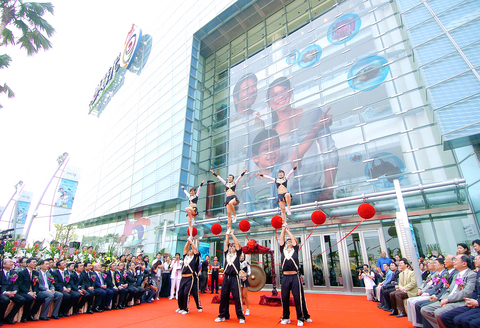Hoping to steal some of the limelight from fashion outlet-packed Taipei, the Dream Mall (
The new shopping mall is the nation's largest, with a floor space of 121,000 ping (399,300m2), the sixth-largest in Asia and the 11th largest in the world.
The mall rises nine stories and has three basement levels and has roped in Japan's Hankyu Department Store; Japan's largest lifestyle and home-furnishing brand, Nitori; the UK's Marks & Spencer; and a sub-zero temperature playground introduced from Japan so subtropical Taiwanese can experience a winter wonderland.

PHOTO: HUANG CHIH-YUAN, TAIPEI TIMES
All of these retailers will make their Taiwan debut at the Dream Mall.
However, Hankyu Department Store, Marks & Spencer and Nitori will not open their doors for business until May 12, when a grand opening ceremony is scheduled.
Dream Mall president Paul Chang (
Chang predicted that the mall, which took an investment of NT$18.5 billion, would break even within three years and start pulling in profits in ten years.
Another much-anticipated feature is the mall's NT$200 million rooftop Ferris wheel, whose 36 carts are painted with Sanrio Co's famous cartoon figures, including Hello Kitty, Cinnamoroll Dog and Badtz-Maru penguin.
The firm said it is the only Ferris wheel in Taiwan with a view of the ocean.
Taipei's Miramar Entertainment Park (美麗華百樂園) in Dazhi District also banks on its rooftop 48-cart Ferris wheel, the second-largest in the world after the wheel atop the Hip Five shopping center in Osaka, Japan, as a draw for those curious to get a bird's eye view of the greater Taipei area.
Statistics show that Kaohsiung's department store and shopping mall market is worth about NT$22 billion per annum. Hanshin Department Store takes the lion's share with sales of NT$10 billion a year.

Micron Memory Taiwan Co (台灣美光), a subsidiary of US memorychip maker Micron Technology Inc, has been granted a NT$4.7 billion (US$149.5 million) subsidy under the Ministry of Economic Affairs A+ Corporate Innovation and R&D Enhancement program, the ministry said yesterday. The US memorychip maker’s program aims to back the development of high-performance and high-bandwidth memory chips with a total budget of NT$11.75 billion, the ministry said. Aside from the government funding, Micron is to inject the remaining investment of NT$7.06 billion as the company applied to participate the government’s Global Innovation Partnership Program to deepen technology cooperation, a ministry official told the

Taiwan Semiconductor Manufacturing Co (TSMC, 台積電), the world’s leading advanced chipmaker, officially began volume production of its 2-nanometer chips in the fourth quarter of this year, according to a recent update on the company’s Web site. The low-key announcement confirms that TSMC, the go-to chipmaker for artificial intelligence (AI) hardware providers Nvidia Corp and iPhone maker Apple Inc, met its original roadmap for the next-generation technology. Production is currently centered at Fab 22 in Kaohsiung, utilizing the company’s first-generation nanosheet transistor technology. The new architecture achieves “full-node strides in performance and power consumption,” TSMC said. The company described the 2nm process as

Shares in Taiwan closed at a new high yesterday, the first trading day of the new year, as contract chipmaker Taiwan Semiconductor Manufacturing Co (TSMC, 台積電) continued to break records amid an artificial intelligence (AI) boom, dealers said. The TAIEX closed up 386.21 points, or 1.33 percent, at 29,349.81, with turnover totaling NT$648.844 billion (US$20.65 billion). “Judging from a stronger Taiwan dollar against the US dollar, I think foreign institutional investors returned from the holidays and brought funds into the local market,” Concord Securities Co (康和證券) analyst Kerry Huang (黃志祺) said. “Foreign investors just rebuilt their positions with TSMC as their top target,

H200 CHIPS: A source said that Nvidia has asked the Taiwanese company to begin production of additional chips and work is expected to start in the second quarter Nvidia Corp is scrambling to meet demand for its H200 artificial intelligence (AI) chips from Chinese technology companies and has approached contract manufacturer Taiwan Semiconductor Manufacturing Co (TSMC, 台積電) to ramp up production, sources said. Chinese technology companies have placed orders for more than 2 million H200 chips for this year, while Nvidia holds just 700,000 units in stock, two of the people said. The exact additional volume Nvidia intends to order from TSMC remains unclear, they said. A third source said that Nvidia has asked TSMC to begin production of the additional chips and work is expected to start in the second